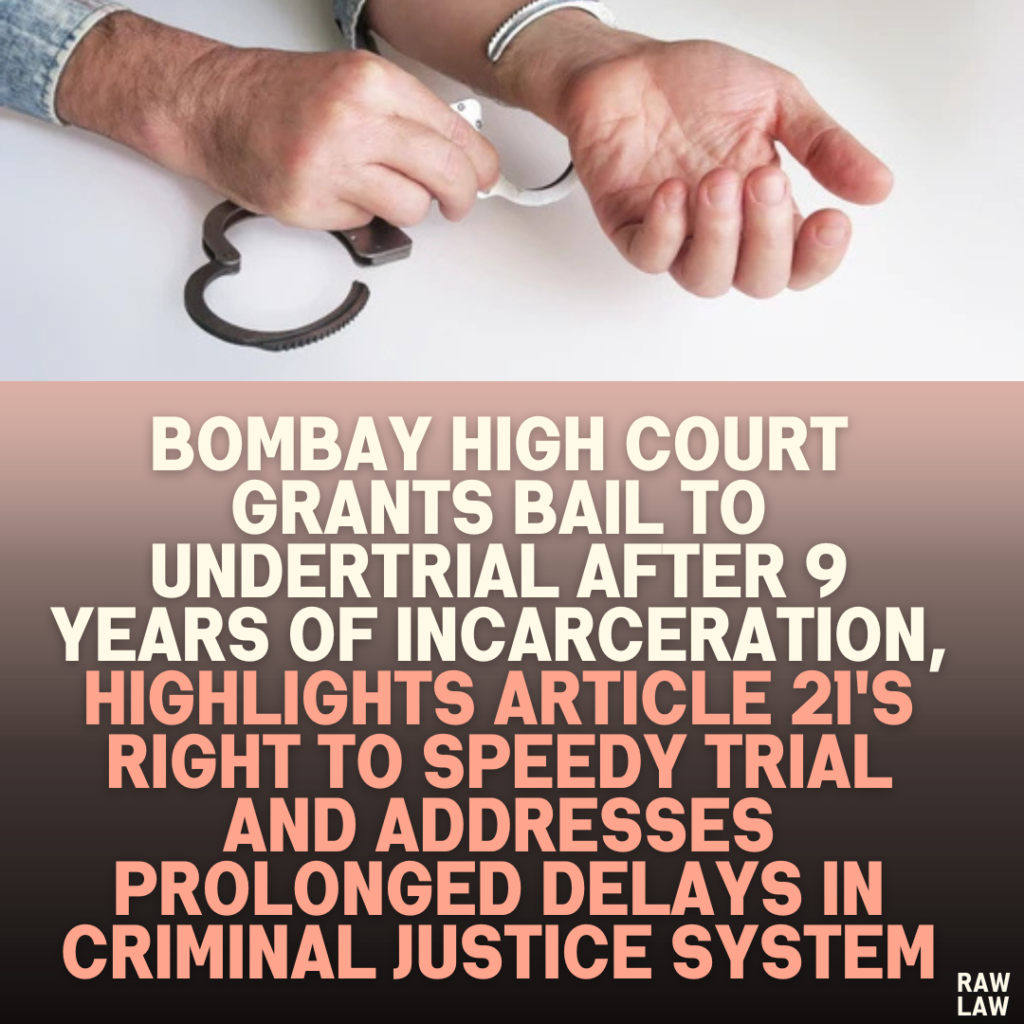1. Court’s Decision:
The Bombay High Court granted bail to the accused based on the following factors:
- The accused had been in custody for over 9 years and 25 days without a foreseeable end to the trial.
- The prolonged incarceration violated the right to a speedy trial guaranteed under Article 21 of the Constitution.
- The Court adhered to the principle that bail is the rule and jail is the exception, especially in cases involving unreasonable delays.
- No evidence suggested that the accused would tamper with evidence or influence witnesses if granted bail.
The Court imposed strict conditions, such as furnishing a bond of ₹50,000 and reporting to the police station monthly, to ensure compliance with the law.
2. Facts:
The case involved an alleged murder and robbery:
- The crime occurred in 2016, and the accused was charged under:
- Sections 302 (murder), 397 (robbery with grievous hurt), and 34 (common intention) of the Indian Penal Code (IPC).
- Sections 4 and 25 of the Indian Arms Act, 1959.
- Sections 37(1) and 135 of the Maharashtra Police Act, 1951.
- The accused had been in custody since January 20, 2016.
- Of the 36 witnesses listed by the prosecution, testimony had only been recorded from four witnesses since the trial began in 2018.
- The other three co-accused had already been granted bail.
- The accused, aged 51, was also undergoing treatment for HIV, a condition exacerbated by his prolonged incarceration.
3. Issues:
- Whether the prolonged incarceration of the accused violated his fundamental right to a speedy trial under Article 21?
- Whether the delay in trial proceedings justified the grant of bail?
4. Petitioner’s Arguments:
The applicant’s lawyer made the following arguments:
- Long Incarceration: The accused had spent more than 9 years in jail without significant progress in the trial.
- Right to Speedy Trial: Prolonged detention without a trial violated Article 21 of the Constitution, which guarantees the right to life and personal liberty.
- Health Issues: The accused was suffering from HIV and required consistent medical care, which was challenging to receive in prison.
- Parity with Co-Accused: Other co-accused had already been granted bail, and the principle of parity warranted similar relief for the applicant.
5. Respondent’s Arguments:
The prosecution opposed the bail application on the following grounds:
- Gravity of the Offense: The accused was charged with serious crimes, including murder and robbery, warranting continued custody.
- Risk of Tampering with Evidence: There was a possibility that the accused could tamper with evidence or influence witnesses if released.
- Prosecution’s Commitment: The prosecution assured the Court that efforts would be made to complete the trial within three months.
6. Analysis of the Law:
The Court referred to various legal principles and precedents:
- Bail as the Rule:
- The Court emphasized the principle that bail is the rule and jail is the exception. This principle is rooted in the idea that personal liberty should not be curtailed unless absolutely necessary.
- In Emperor v. H.L. Hutchinson (1931), the Allahabad High Court stated that courts must exercise their discretion to grant bail judiciously, keeping in mind that detention before conviction must be an exception.
- Speedy Trial:
- The Court highlighted that the right to a speedy trial is a fundamental right under Article 21 of the Constitution, as recognized in Hussainara Khatoon v. State of Bihar (1980).
- Delays in trials not only violate the accused’s rights but also undermine public confidence in the criminal justice system.
- Humanitarian Considerations:
- The Court acknowledged the mental and physical toll of prolonged incarceration, citing studies on the psychological impact of prison life.
- It referenced Maneka Gandhi v. Union of India (1978), which held that procedures depriving personal liberty must be fair, just, and reasonable.
7. Precedent Analysis:
The Court referred to multiple precedents to support its decision:
- Satender Kumar Antil v. CBI (2022): Highlighted the need to avoid prolonged incarceration of undertrial prisoners and emphasized bail as a rule.
- Shaheen Welfare Association v. Union of India: Asserted that undue delays in trial justify the grant of bail.
- Union of India v. K.A. Najeeb (2021): Stated that prolonged detention without trial infringes on an accused’s fundamental rights.
- Javed Gulam Nabi Shaikh v. State of Maharashtra (2024): Reiterated that the State must ensure a speedy trial or grant bail when delays occur.
8. Court’s Reasoning:
- The Court noted that 9 years of incarceration without significant trial progress violated the accused’s right to liberty and speedy trial under Article 21.
- The prosecution’s assurance to complete the trial in three months was unconvincing, given the slow progress over the previous 9 years.
- The accused’s medical condition and the principle of parity with co-accused were additional factors that warranted bail.
- The Court observed, “Detaining an under-trial prisoner for such an extended period violates his fundamental right to a speedy trial flowing from Article 21 of the Constitution.”
9. Conclusion:
The Court granted bail to the accused on the following conditions:
- Furnish a bond of ₹50,000 with one or two sureties.
- Report to the police station once a month for three months.
- Cooperate with the trial and attend all hearings unless specifically exempted.
- Refrain from influencing witnesses or tampering with evidence.
- Notify the Investigating Officer of any change in address or contact details.
The Court clarified that its observations were limited to the bail application and did not affect the merits of the case.
10. Implications:
This judgment underscores the importance of safeguarding the right to personal liberty and ensuring the speedy disposal of cases. It also highlights systemic issues, such as prison overcrowding and delays in the judicial process, emphasizing the need for reforms to prevent undue hardship for undertrial prisoners.
